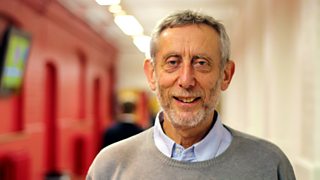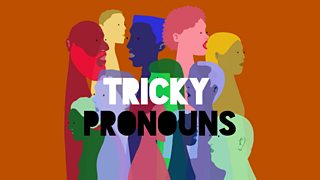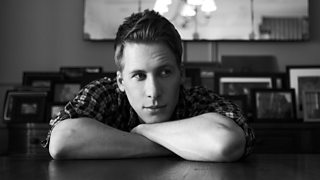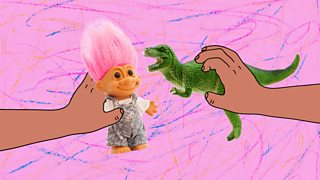Realness, fierceness and throwing shade: what is LGBTQIA+ slang and why is it so important?
The Queens' English: The LGBTQIA+ Dictionary of Lingo and Colloquial Phrases is a comprehensive guide to modern gay slang, queer theory terms, and the colloquialisms that define and celebrate LGBTQIA+ culture.
In Word of Mouth its author, Chloe O. Davis, talks to Michael Rosen about “shade”, “fierce”, and the importance of etymology.
-
![]()
LGBTQIA+ slang
Word of Mouth: Listen to Chloe and Michael in conversation.
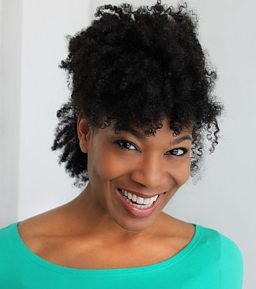
What do the letters in LGBTQIA+ stand for?
These stand for Lesbian, Gay, Bisexual, Transgender, Queer (although the "Q" can also represent Questioning), Intersex, and Asexual. The plus sign is used to acknowledge the plethora of identities that fall outside these labels. These include terms like pansexual, aromantic, non-binary, bigender, fluid, and androgenous.
A celebration of slang
We’re in a climate now where we want to embark on conversations about what inclusion, equity and diversity look like, says Chloe. There needs to be a dialogue around the true spectrum of human identity – whether that be your sexual orientation or expression, and gender identity. This dictionary is a tool for all of us – whether we identify as queer or not – to be able to dive deeper into these conversations and to gain understanding.
“But, more importantly, this dictionary is a celebration of the diverse language that is used to describe the spectrum of gay and queer identity,” says Chloe. “It’s a celebration of what true human identity looks like and it is not binary, it is not monolithic, it is diverse.”

Why is etymology significant?
The etymology of these words is important, says Chloe, and that’s because language lays the foundations of culture. We understand culture more when we know the origin of how these words evolved.
For example, in the 1950s and '60s, when homosexuality was illegal, it was common for gay men to use the she/her pronouns or women’s names to identity their lovers – because it protected them. About a century ago – when you were ostracised for being black and for being gay – the Harlem Renaissance took place. There were extravagant underground drag balls, created by black and Latinx gay and trans queer individuals to supplement their self-worth, identity and community. They created the phrase, “in the life”, to mean gay or queer – a code used to disguise it’s meaning from the mainstream.
So a lot of this language comes from safety, says Chloe. It also comes from a need for expression, wanting to validate an experience and to say I’m not alone, and from the queer community.

How early does gender stereotyping begin?
Can you tell if a baby is a girl or a boy by the sound of its crying?
Words that sprang out of the New York ballroom scene
Many more words and phrases were born out of the ballroom scene, Chloe explains.
At these balls, walkers would walk or compete to win trophies and prizes based on their presentation. Throwing shade was “to insult or blatantly show contempt for” your opponents, undermining their attitude, ability or appearance. It’s a phrase that has since been appropriated by the larger LGBTQIA+ community and mainstream culture.
Realness is “a quality someone possesses when they have the ability to copy and bring to life a specific look or behaviour,” says Chloe. The term is often used in succession with another adjective or noun: “You are giving major Olivia Pope realness in that white coat today.” Within the ballroom scene, it is a competition where a participant is judged on their ability to embody a particular look or persona in a way that is authentic and realistic. Popular categories include femme queen realness, school boy realness, executive realness and thug realness.
The word fierce is praise that a person might get when they are walking in a ball, says Chloe. It’s celebrating when they are giving it their all and enticing the audience and the judges.
Butch queen is a category competition in the ballroom scene for cisgender men. (Cisgender means that the sex a person is assigned at birth is also how they identify.) It means a gay, bisexual or queer man who possesses both masculine and feminine traits.
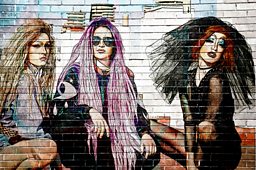
Crediting the community
We now hear many of these words on TV and social media and in the streets. What often began as underground language has been adopted and appropriated by mainstream culture because it’s so “creative and useful and prevalent,” says Chloe.
It is disrespectful for other people to give labels to someone who has not self-assigned themselves that label.
But sometimes when it’s taken, it’s not used correctly, and it can be used with malice. Crucially, says Chloe, when it comes to labels, these are identities that an individual gives themselves. It is disrespectful for other people to give labels to someone who has not self-assigned themselves that label.
And with words that have been adopted by the mainstream – like fierce and realness – proper credit needs to be given to the community that created them.
Chloe hopes her dictionary will help. “Now the world understands that this is language that belongs to a community so we need to respect it and honour it, and hopefully in time we will all learn to celebrate it.”

More listening and reading on Radio 4
-
![]()
Tricky: Are pronouns Important?
Why is it important to get someone's pronoun right?
-
![]()
Women and words: why language matters
Exploring how sexism is reflected in the English language.
-
![]()
Archive on 4: The End of Coming Out?
Dustin Lance Black asks whether LGBTQ+ people still need to come out publicly.
-
![]()
Woman鈥檚 Hour: Gender neutral parenting
As neutral pronouns start to enter the public arena, so too has the idea of gender-neutral parenting.
